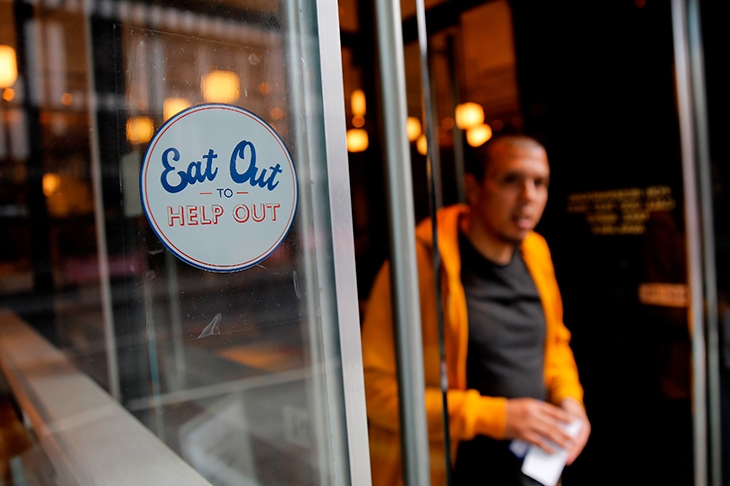These past five Covid-buffeted months have shone a spotlight as never before on the choices we as a nation make about and around food. We are quite confused when it comes to eating. The government’s two recent messages on the subject are in conflict with each other: it’s our civic duty to ‘eat out to help out’, we’re told, but also we need to lose weight to protect the NHS. These muddled messages were evidenced by the somewhat mad poster advertising ‘eat out to help out’: after listing the practical terms of the scheme, the optimistic last line reads ‘Look out for better health choices’. I don’t know about you, but if I’m going to dine out, I’m going to get something tasty and tempting. I can have all the tuna salad I want at home.
But the key word on that advertisement is ‘choices’. Above all, these months have served as a reminder of what an often overlooked luxury choice is when it comes to food, and how it regularly comes down to the issue of resources: it requires pounds sterling to dine out, just as losing pounds of weight often necessitates the same. My worry about the government’s attempt to make us a nation of healthy eaters is that it puts further financial pressure on those who are already pushed towards cheap sugar-laden and fat-sodden products. It removes choice from people who already have very little.
At the start of the pandemic, in those frenzied few weeks of stocking up, stockpiling and supermarket shortages, it was salutary to witness what supplies people flocked to. It certainly wasn’t avocado or sushi, overpriced sandwiches or fancy-schmancy takeaway coffees. No, it was the common-or-garden staples of everyday life that everyone was suddenly so fretful about: eggs, pasta, bread, vegetables, tinned tomatoes and, yes, loo rolls. I remember an early-March trip to our local supermarket, Waitrose, and contrasting the stripped-bare aisles of pasta and tinned goods with the overflowing and now entirely ignored abundance of the expansive fresh sushi counter. There is, of course, a murky grey zone that separates stocking up and stockpiling, but when push came to shove, people sought out baked beans, not shrimp gyoza. It was, in a way, a shadow of those food lessons learned the hard way during the rationing of the second world war.
Throughout the toughest weeks of lockdown, when lots of the happily furloughed middle-classes took to making banana bread and caused a nationwide run on flour, doughty food banks throughout the country continued with their vital work of supplying the most needy. Tiring a little of making dozens of lemon drizzle cakes as cheer-up gifts for friends, I volunteered for our local food bank, which transformed itself almost overnight from a drop-in centre to an intricately socially distanced, delivery-based operation.
There is nothing like packing the bags to be taken out to clients to focus one’s attention on what a precious thing choice is when it comes to food. I was gently chided by the supervisor at one session for taking so long to put together my parcels of three days’ worth of essential supplies. The idea of choosing someone else’s food sat heavily with me: how could I possibly know what they would want? Tinned peaches or tinned nectarines? Tomato or vegetable soup? None of the above? Does anybody really want rice pudding, an item I had falsely assumed went out with the end of rationing? Why anyone would think that a food bank is the best place for an astonishingly wide-ranging assortment of speciality teas and coffees continues to bewilder me. Coconut tea is a kindly but misguided donation, I feel. PG Tips would be far more useful.
Last week, I delivered food-bank parcels to clients who live almost opposite Waitrose. I was happy to do something small to help, but I also felt a slippery kind of guilt at the knowledge of the well-meaning but slightly random selection of goods I was dropping off, many of them products I would never have selected for myself. An hour later I was back at Waitrose to do the family food shop, spending a frankly embarrassing £220. How lucky to be able to choose, for example, an array of fresh fruit and veg, not to mention posh Charlie Bigham’s ready meals for when we can’t be bothered to cook from scratch. That evening, I chose to eat out to help out by going to a local restaurant; in that same eatery-packed high street, almost every venue has been fully booked for every Monday to Wednesday since the deal was introduced. What a day of choices it had been and what an undeniable privilege to be able to entertain them all.
Got something to add? Join the discussion and comment below.
Get 10 issues for just $10
Subscribe to The Spectator Australia today for the next 10 magazine issues, plus full online access, for just $10.
You might disagree with half of it, but you’ll enjoy reading all of it. Try your first month for free, then just $2 a week for the remainder of your first year.














Comments
Don't miss out
Join the conversation with other Spectator Australia readers. Subscribe to leave a comment.
SUBSCRIBEAlready a subscriber? Log in